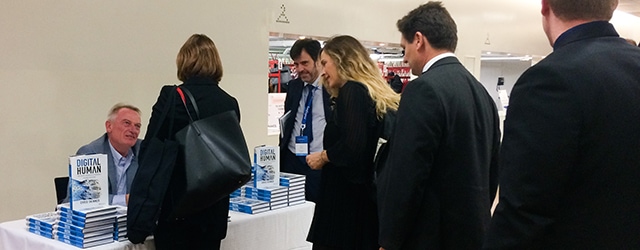FinTech expertChris Skinner discusses innovation, disruption and the bank of the futureat Eurofinance's 27th annual treasury management conference.

Normally queuing for treasurers attending EuroFinance’s International Treasury Management conference is confined to the registrations desk. But on Wednesday at the annual event—held in Geneva this year—treasurers were queuing for a different reason: To get a signed copy of fintech commentator Chris Skinner’s new book Digital Human: The Fourth Revolution of Humanity Includes Everyone.
Skinner had just come off the main plenary stage where he told an audience of hundreds of treasurers that “fintechs like to play with dinosaurs [the banks]” and that the bank and bankers of the future would be a “place to store digital assets or curators and marketplaces of life events.”
According to Skinner, treasurers want their banks to bring them best-of-breed fintech companies rather than having to go out and find them on their own. “But that’s a challenge,” he added, “as the partners in these fintechs are young (typically under the age of 30) and want to attack everything, while the financial system wants to keep it all resilient, robust and secure.”
Skinner said fintechs needed to be more respectful of the ‘dinosaurs.’ “They want to destroy the banks,” he said. “But a lot of these start-ups don’t have many customers or trust so they need to work with the banks to get that. They don’t need to destroy the banks, they just need to revitalize them.”
Whilst code-writing ‘kids’ (young millennials) are changing the face of finance, Skinner says banks are boring because they have hundreds of years of history and are heavily regulated. He also criticized the senior management of banks, describing them as old-timers who did not understand digital banking. “More than 90% of banks’ boardroom members have never had direct experience with technology,” he said, “or been a CIO or CTO. How can they build the next generation of digital services? Legacy systems, legacy people.”
However, Skinner predicts that the big internet giants won’t move into banking as many have predicted since they don’t want to be as heavily regulated as the banks. “They will, however, go after the low-hanging fruit,” he says, “and leave the more complex stuff to the banks.”
Remarking on Skinner’s plenary presentation, Carole Berndt, a transaction banker of 20 years now strategic advisor at Transition Hub, which consults on workforce changes caused by automation, said she foresees the banks, given the weight of regulation they are under, becoming the trusted pipes and plumbing for delivering financial services. “But at some point in the future,” she says, “treasurers are more likely to go direct to third parties to buy value-added solutions.”
On the subject of cryptocurrencies, Skinner said he didn’t think Bitcoin would survive. “There will be a [digital global] currency, but I don’t think it’s Bitcoin,” he said.
However, he was more enthused by the blockchain or distributed ledger technologies saying that although they are becoming more complex to understand, they enable the sharing of databases with people you don’t trust, which could potentially save the financial services industry billions.
“Blockchain is a fundamental technology for the future,” said Skinner. “It will get rid of letters of credit and bills of lading and enable real-time tracking of orders with no human hand involved.” But it could be 10 years before we really start seeing blockchain permeating more aspects of financial services, including clearing and settlement, said Skinner, as most of the initiatives today are still largely foundational research projects.



